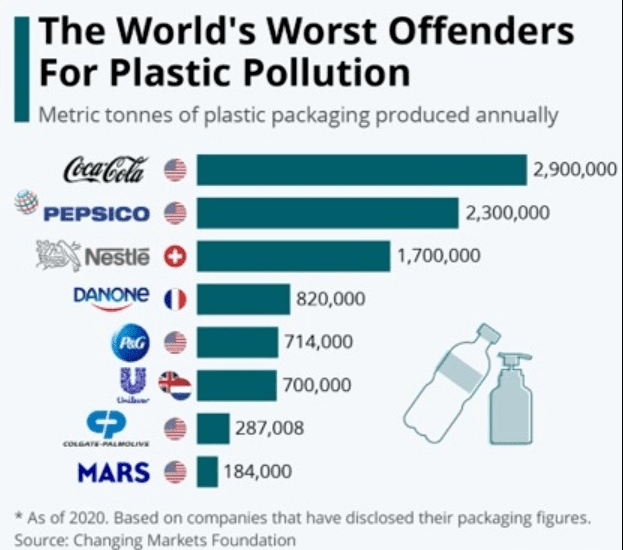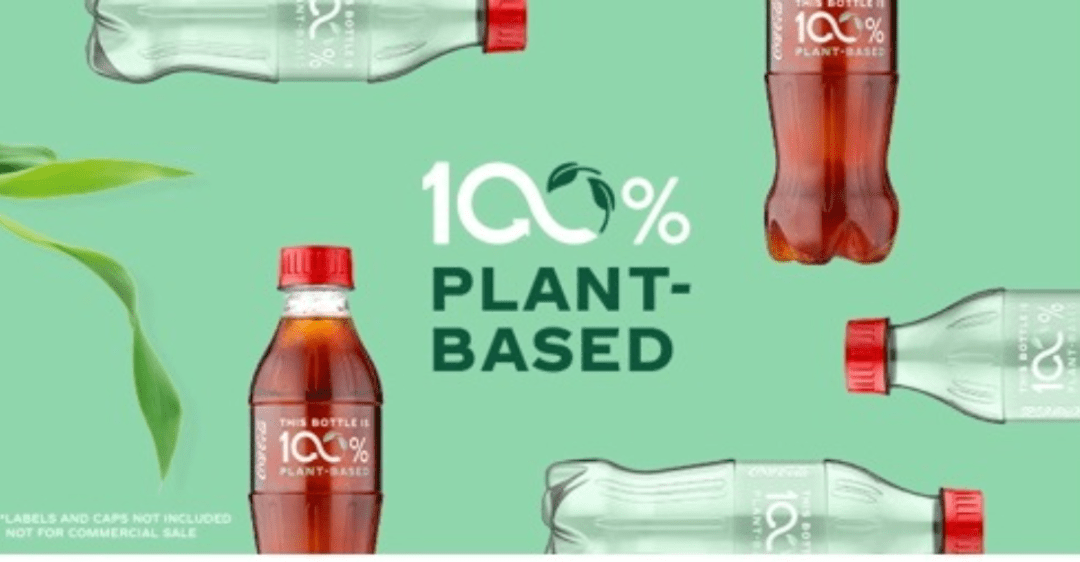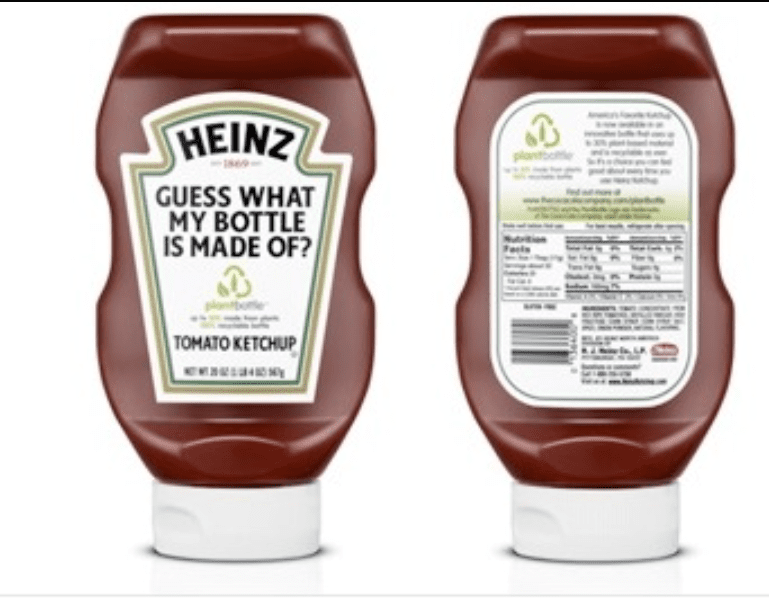As human activities become more concerned and aware of the current critical situation of the planet, individuals, companies and governments are actively working to implement more sustainable lifestyles. Coca-Cola, one of the largest producers of plastics, has created two plant-based biodegradable bottles that are both environmentally friendly and reduce their carbon footprint. By 2030, Coca-Cola is committed to having 100 percent of its packaging recyclable and 50 percent made from recycled or renewable materials. Through these efforts, Coca-Cola hopes to achieve net-zero CO2 emissions by 2050. Moving away from predominantly non-biodegradable fossil fuel plastic packaging to plant-based biodegradable packaging is a great way to combat climate change.
Coca-Cola plastic production
Companies such as Coca-Cola, PepsiCo and Nestlé contribute the most to annual plastic production. As shown in the chart, Changing Markets Foundation 2020 statistics show that Coca-Cola produces nearly 2.9 million tons of plastic packaging annually - that's more than Mars, Colgate-Palmolive, Unilever, Procter & Gamble, and Danone, which rank fourth to eighth in producing the most plastic packaging in the world.

PET is made from oil and natural gas - two non-renewable resources with a very large carbon footprint. If Coca-Cola does not want to continue to be the "worst offender of plastic pollution," then it is important to look for alternative options.
"A World Without Waste" program
To reduce the production of non-biodegradable plastics, many companies prefer to create biodegradable waste - waste that can biodegrade into the environment without damaging the surrounding soil or environment - or sustainable waste - waste that can be recycled or reused. In 2018, Coca-Cola launched its "World Without Waste" program, which focuses on creating new sustainable packaging production and delivery systems and encouraging the recycling of unsustainable packaging materials, as shown here. Coca-Cola has announced a goal to reduce 3 million tons of plastics from petroleum-based sources by 2025. This 3 million tons equates to a 20% reduction in the use of petroleum-based plastics, and Coca-Cola hopes to achieve this goal by encouraging more recycling through recyclable and reusable bottles, and creating new lightweight and bio-based bottles.
In addition, by 2030, Coca-Cola hopes to remove petroleum-based PET used in plastic bottles in Japan and Europe. Coca-Cola launched their first "plant-based eco bottle" in 2009, but this prototype contained terephthalic acid (PTA), made from petroleum-based ingredients, however, Coca-Cola's mission is to reduce petroleum-based plastics, so they researched additional formulations. In 2015, Coca-Cola presented the world with a prototype of a 100% bio-based sourced plant-based eco bottle through a lab-scale biochemical product. After nearly twelve years since 2009, Coca-Cola remains one of the world's largest manufacturers of plastic, despite the fact that the "Plant-Based Bottle" packaging has reduced carbon dioxide emissions by 100,000 tons, equivalent to the carbon dioxide emissions from the nearly 200,000 barrels of oil used to produce Coca-Cola's PET plastic packaging. The Coca-Cola Company is in the midst of an imminent and massive transformation to reduce plastic production and reduce its carbon footprint.
Coca-Cola seeks many partners to achieve its sustainability goals. For example, Coca-Cola partnered with UPM and Changchun Meihe Technology to launch a 100% plant-based eco-friendly bottle (excluding the cap and label), and a lab-scale prototype was eventually made into a full-size bottle in 2015 and is ready for mass production. Nancy Quan, Coca-Cola's chief technology and innovation officer, said, "For years, we've been working with our technology partners to develop the right technology to make 100% plant-based bottles: aiming to reduce our carbon footprint as much as possible."
Ingredients of the plant bottle
The plastic bottle is made from PET, which is made from monoethylene glycol (MEG) and terephthalic acid (PTA) in a ratio of 3:7. Originally released by Coca-Cola in 2009, the plant-based Eco Bottle contains 30% plant-based mono-ethylene glycol (bio-MEG) from sugar cane and 70% petroleum-based source PTA. The new plant-based eco bottle is 100% plant-based, and the PTA used comes from plants. In response to the 2009 plant-based eco bottle formulation, Dana Breed, global director of research and development for packaging and sustainability at The Coca-Cola Company, said, "Our goal for plant-based PET is to use surplus produce to minimize our carbon footprint, so incorporating the commercialized technology brought by our partners is a perfect fit for this strategy. " Coca-Cola identified the source of its bio-based ingredients to make the plastic.
In addition, when considering ingredients, Coca-Cola seeks to create sustainable economic practices as well as sustainable production practices. Scott Vitters, then director of packaging at Coca-Cola, commented on the 2009 Botanical Eco-Bottle composition and said, "The plants we use in our Botanical Eco-Bottle packaging were specifically selected based on sustainability criteria to ensure they do not compete with food crops and provide better environmental performance. " In 2021, when Coca-Cola made its new plant-based eco-bottle, it entered into a collaboration with partner companies to deliberately select certain sustainably produced crops whose raw materials or bio-based waste could be reused and used to make plastics.

Virent Energy Systems, a company that converts sugar feedstocks into petroleum products, has a method for making plant-based PTA. This method was used by Coca-Cola to convert plant-based paraxylene (bio-PX) derived from corn sugar to plant-based PTA (bio-PTA). Coca-Cola's plant-based eco bottles are the first beverage packaging made from mass-produced bio-PX. In addition, Coca-Cola was able to create a more efficient bio-MEG production technology.
Expanding Partnerships
Coca-Cola not only seeks to come up with sustainable solutions to environmentally harmful practices within the Coca-Cola industry, but also shares practices with other companies. Breed said, "Our goal is to develop sustainable solutions for the entire industry, and we want other companies to join us and move forward together. We don't see renewable or recyclable content as an area where we want a competitive advantage." Coca-Cola shares its technology and branded products with non-competing companies such as ketchup company Heinz. As shown here, Heinz partnered with Coca-Cola to create a ketchup bottle using the plant-based packaging prototype introduced by Coca-Cola in 2009. Then in 2018, Coca-Cola also shared the plant-based eco-bottle IP with competing companies. they sold more than 10 billion plant-based eco-bottle packages worldwide.

The impact of sustainable packaging on consumers
Many people are adopting sustainable practices by reusing glass jars in their daily lives, bringing reusable bags to the grocery store, and reducing the amount of water they use when washing dishes or showering. These small acts empower people and remind them of their contribution to a global plague: climate change. According to Trivium Packaging's Global Buying Green Report in 2021, 67% of consumers consider themselves environmentally conscious and will consider whether packaging is recyclable when purchasing products.
83% of young consumers (44 and under) surveyed said they would be willing to pay extra for sustainable packaging, and 70% of all consumers surveyed said they would be willing to pay extra for sustainable packaging. As news and social media attention to climate change and climate change activists has grown, so has knowledge of various packaging materials.
While many people know little about metals and glass, most are very familiar with the non-biodegradable nature of plastics.
Major companies need to start taking extra steps to provide environmentally friendly packaging. Consumers are willing to pay extra for sustainable packaging, and companies don't need to worry about possible extra costs because they can compensate for this by increasing the price of their products.
When consumers are willing to take a step forward, companies should be ready. Coca-Cola's "World Without Waste" initiative gives consumers hope that one of their favorite beverage companies is taking proactive steps to eliminate environmentally disastrous practices and that they can be a part of those efforts.

